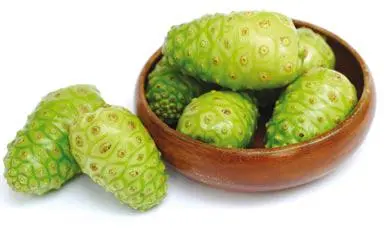Noni – Morinda citrifolia
Indian mulberry – the shrub comes from Southeast Asia and Australia. It has been consumed for millennia and used as a medicine for various diseases. And although noni is used in Western medicine without detailed research, it is absolutely certain that this fruit can be used for many diseases without fear of negative side effects.
Noni tree grows to 1-1.5 meters in height. It can survive and bear fruit in a variety of weather conditions and has a unique ability to regenerate. The fruit of this tree has the form of a pomegranate, its flesh is whitish-yellowish with an unpleasant taste and smell.
What does Noni contain?
Some of the active ingredients found in seeds, roots and bark are already known to science: proxeronine, vitamin C, carotene, potassium compounds and damnactal, which supports proper cell division, and scopoletin, which has anti-inflammatory effects by blocking the production of cytokines, antioxidant, hepatoprotective and spasmolytic. Studies have also shown that scopoletin triggers the process of apoptosis of altered leukocytes in leukemia. Noni also contains useful fatty acids (linoleic acid, caproic acid) and bioflavonoids (rutin).
Let's consider what health problems noni's active substances can help with!
Proxeronine
Proxeronine, which the body transforms into active xeronine, supports proteins responsible for cell development and the formation of their proper structure, thus contributing to health protection. Due to its properties, proxeronine is useful in diseases such as hypertension, stomach ulcers and arthritis.
The fruit contains a substance with antibiotic properties (acubin, alizarin), which are effective against bacterial infections, for example salmonella, E. coli, Helicobacter pylori, which is the cause of stomach ulcers, or tuberculosis bacilli, which are the cause of tuberculosis. Noni's anti-inflammatory substances do not irritate the gastric mucosa. Moreover, its antiviral and antifungal properties have been scientifically proven. Studies have shown that noni is effective in combating abnormal cell division. It can prevent the occurrence of certain types of cancer and block the development of existing ones. Noni is used with traditional therapeutic methods, which makes the treatment more effective.
More and more independent research confirms its hypotensive and diuretic properties. Many scientists believe that noni is effective in the treatment of hypertension, one of the most common lifestyle diseases.
Noni has a beneficial effect on the cardiovascular system. The results show that with regular use of noni extract, the level of cholesterol and triglycerides in the blood is significantly reduced.
Additionally, independent studies have shown the effectiveness of noni in protecting the liver.
Sources:
Wang, Mian-Ying, West, Brett J, Jensen, C Jarakae: Morinda citrifolia (Noni): A literature review and recent advances in Noni research. Acta Pharmacol Sin 2002 Dec 23 (12): 1127-1141
Nelson, Scot C.: Species Profiles for Pacific Island Agroforestry Morinda citrifolia (noni). www.traditionaltree.org
Saf-ur Rehman Mandukhail et al: Studies on antidyslipidemic effects of Morinda citrifolia (Noni) fruit, leaves and root extracts. Lipids in Health and Disease 2010, 9:88




